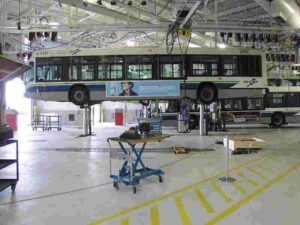5 Benefits of Electric Buses Explained
Benefits of electric buses include; improved urban air quality, lower cost of maintenance, facilitation of energy transition, noise reduction, and minimal climate change impact.
This article discusses the benefits of electric buses, as follows;
1). Improved Urban Air Quality (as one of the Benefits of Electric Buses)
Alongside hybrid vehicles, electric bus usage reduces the risk, rate and severity of air pollution [1].
Lower air pollution associated with electric buses is as a result of the non-dependence of these vehicles on fossil fuels as a primary energy resource for their operation.
Toxins like particulate matter and sulfuric oxides that cause acid rain, environmental degradation and health problems, tend to generally reduce in areas where electric bus usage is significant, since the rate at which fossil fuels are extracted, processed and burnt, all reduce under such circumstances.
Lower air pollution rate and improved air quality are also indicative of improved energy management; which could be itemized to include energy conservation, fuel efficiency, waste energy reduction and energy efficiency, among others.
Electric buses manage energy effectively as a result of the use of efficient batteries for energy storage. This characteristic also increases the flexibility of the vehicle, and makes it serve as a distributed energy resource that can be used to convey stored energy from one location or system to another.
2). Lower Cost of Maintenance
The overall cost of operation of electric buses tends to be lower than that of their gasoline counterparts.
A significant cause of this reduced-cost is low maintenance requirement of electric buses.
Electric buses have fewer internal components with less complexity than gasoline vehicles, so that their demand in terms of repair and maintenance is relatively low.
Absence of internal combustion engine (ICE) in electric buses implies that there is less susceptibility to operational wear, or damage.
The outcome is significant cost saving for electric buses compared to hybrid vehicles, in terms of fuel, repair, and routine maintenance requirements.

3). Facilitation of Energy Transition (as one of the Benefits of Electric Buses)
Because of their non-use of fossil fuel, electric buses represent a shift in the direction of possible renewable energy adoption [3].
The role of electric buses (as well as electric cars) toward sustainable energy transition is further helped by the use of electricity from solar panels, wind turbines, and other clean energy technologies, to recharge vehicle batteries [2].
Full adoption of clean energy for electric buses and other power-dependent systems, is one of the goals of sustainable development, as well as a means by which green economy can be actualized.
It is controlled significantly by the energy efficiency of renewable energy technologies, which is being actively improved through research and development.
4). Noise Reduction
Their relatively simple design, and lack of fuel-fired engines, cause electric buses to operate with much less noise than gasoline vehicles.
This is a major advantage especially in metropolitan areas, where noise pollution from automobile traffic is a problem.
Noise reduction can lead to increase in productivity on both social and economic levels.
5). Minimal Climate Change Impact (as one of the Benefits of Electric Buses)
Along with technologies like carbon capture and storage, electric buses are instrumental for achieving economic decarbonization at various levels.
Greenhouse emissions generally experience significant volumetric decrease wherever electric buses constitute a major proportion of the transport fleet.
As a result, unfavorable environmental phenomena like global warming, ozone depletion and climate change, become less prominent.
The ripple effect of climate change mitigation can be positive toward sustainable agriculture, public health and economic development; and may play a role in addressing socioeconomic challenges like food insecurity and land loss by desertification.
Conclusion
Benefits of electric buses are;
1. Improved Urban Air Quality
2. Lower Cost of Maintenance
3. Facilitation of Energy Transition
4. Noise Reduction
5. Minimal Climate Change Impact
References
1). He, X.; Ke? W.; Zheng, Y.; Zhou, B.; Wu, Y.(2017). “Energy consumption and well-to-wheels air pollutant emissions of battery electric buses under complex operating conditions and implications on fleet electrification.” Journal of Cleaner Production 171. Available at: https://doi.org/10.1016/j.jclepro.2017.10.017. (Accessed 26 December 2022).
2). Jurasz, J.; Ciapala, B. (2019). “A solar- and wind-powered charging station for electric buses based on a backup batteries concept.” ICT for Electric Vehicle Integration with the Smart Grid (pp.317-335). Available at: https://doi.org/10.1049/PBTR016E_ch12. (Accessed 26 December 2022).
3). Rehman, N.; Hijazi, M.; Uzair, M. (2020). “Solar potential assessment of public bus routes for solar buses.” Renewable Energy 156(1). Available at: https://doi.org/10.1016/j.renene.2020.04.081. (Accessed 26 December 2022).